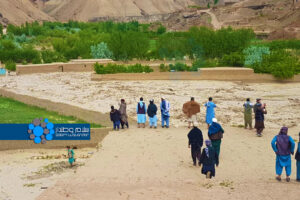KABUL (SW) — Women are facing gender-based biases and injustices in the various tiers of the judicial system, victims told Salam Watandar.
After the collapse of the Republic, special institutions supporting women’s rights were removed from the legal-administrative structure of Afghanistan, and women’s access to legal services was reduced to a great extent and in some cases, it disappeared. According to the information obtained by Salam Watandar, when women go to justice and judicial centers, they are confronted from both sides, and in some cases, their cases are not investigated, remain suspended, or are decided in favor of men.
Zahal — a pseudonym — a defense lawyer in the previous government, who has been a witness in cases of this kind for the past two years, told Salam Watandar: “A woman’s case is actually ongoing, it is a case of divorce from her husband, but the president of the court behaves very badly. He tells her you are the one who wants to divide your husband and every day, he delays his case for different reasons.”
Similarly, Bashir-pseudonym-another defense lawyer in the previous regime, said that during the current regime, in a number of cases, women whose husbands have four or three wives and have requested divorce because of a problem they had with their husbands. The court has asked them to withdraw from their lawsuit. “In case of an argument, they would say to the women: Go back, he is your husband, get along with him, leave it. You have children.”
A number of women’s rights activists and officials of women’s support institutions in the previous government say that after the collapse of the Republic, women do not have access to legal services and judicial centers do not pay attention to women’s legal cases. “Women do not have access to justice centers,” said Mahbobeh Siraj, a women’s rights activist. “Currently, there is no foundation to support women. All the lawyers have left.”
Zarqa Yeftali, another women’s rights activist, said: “Women who worked in judicial institutions lost their duties, including women who were defense lawyers, today they can’t even get a license. When women are not present, when women cannot go to various institutions, then there is no service supply.”
During the period of the Republic, along with the existence of the Ministry of Women’s Affairs in the administrative structure of the government, the Independent Human Rights Commission and a number of domestic and foreign institutions were active in the supporting women’s access to legal services. But in the last two years, all these institutions have disappeared and lack of access to legal services has become the most serious problem for women.
Shahrazad Akbar, head of the dissolved Human Rights Commission of Afghanistan, said: “Women currently do not have access to legal services in Afghanistan. Unfortunately, very alarming cases are reported that when women go to legal authorities for their problems, they are treated badly or because of their shortcomings.”
Also, a number of international institutions say that with the closure of women’s support institutions in Afghanistan, women’s access to legal services has decreased and the caretaker government’s view of cases related to women is also different from other countries.
Sahar Fitrat, an official of Human Rights Watch, told Salam Watandar: “In general, the Taliban’s view of the justice and legal system is very different from the standards and values of humanity and the standards and values of human, international and judicial rights in the world,” he said. He added that now there is no organization supporting women in Afghanistan, and the Ministry of Women’s Affairs, which could support women against family violence and other violence, has also been dissolved.
In addition to limited access to legal services, after the formation of the caretaker government, women have also lost many other rights. One of these cases is the subtraction age based on the husband’s absence, which was considered four years in the past, but now, according to Hanafi jurisprudence, it has increased to 99 years.
A person involved in women’s cases, who does not want his identity to be revealed in the report, said about this: “The mixing of the two judicial and investigative departments has caused the cases to not be resolved soon, the density of cases has increased. There was a special court, while he is gone, all of it is included in the penal court. There is no other department that can help and cooperate with them.” He added that most cases of violence against women in Afghan courts have been decided in favor of men.
A number of Kabul residents who have witnessed cases of violence against women say that due to the neglect of these cases by judicial institutions, women inevitably suffer violence and do not go to any body for litigation.
Mursal, a resident of Kabul, said: “We have to endure all kinds of violence and all kinds of gossip in our lives because there is no judicial and legal apparatus to defend women, there is no authority to support women’s rights. For this reason, we are forced not to refer to judicial and legal services at all.”
Narges, another resident of Kabul, told Salam Watandar: “we are witnessing many cases that are not investigated because there is no support for women, and women cannot present their cases in court and have their cases examined.”
However, Inayatullah, the deputy spokesperson of the Supreme Court of Afghanistan, told Salam Watandar that when women go to judicial centers, their cases are investigated. “Women can present their cases, they can submit their cases to the courts as much as they want. If they are threatened, they can share their case with the courts. As long as women’s cases are investigated, we have a prison as well.” According to the spokesperson of the Supreme Court, 160 women’s cases from the Republic period were also left in the courts untended.
On the other hand, after the collapse of the Republic, the work permit of female defense lawyers was also suspended and now, no female defense lawyers are active in Afghanistan, an issue that has limited women’s access to legal services.
Pariza Naseri, a defense lawyer who was stripped of her legal rights when the caretaker government came into effect, said: “Women’s legal licenses have been suspended since the Taliban government came into effect until today. Women cannot file lawsuits, or demand their rights, go to justice and legal centers for their rights and have their work investigated. Therefore, they do not have access to legal and judicial services.”
However, Inayatullah, the deputy speaker of the Supreme Court of the caretaker government, said that women can act as attorneys based on principles.
However, at the same time, Abdulhamid Jihadyar, the spokesman of the Ministry of Justice, told Salaam Watandar that the license of women’s attorneys is suspended until further notice. Jihadyar said: “There is still a suspension, like the issue of education and other things related to women’s work. until the leadership of the Islamic Emirate decides about this. Until the leadership of the Islamic Emirate makes a decision, women and girls will not be granted attorney’s licenses.”
ENDS






